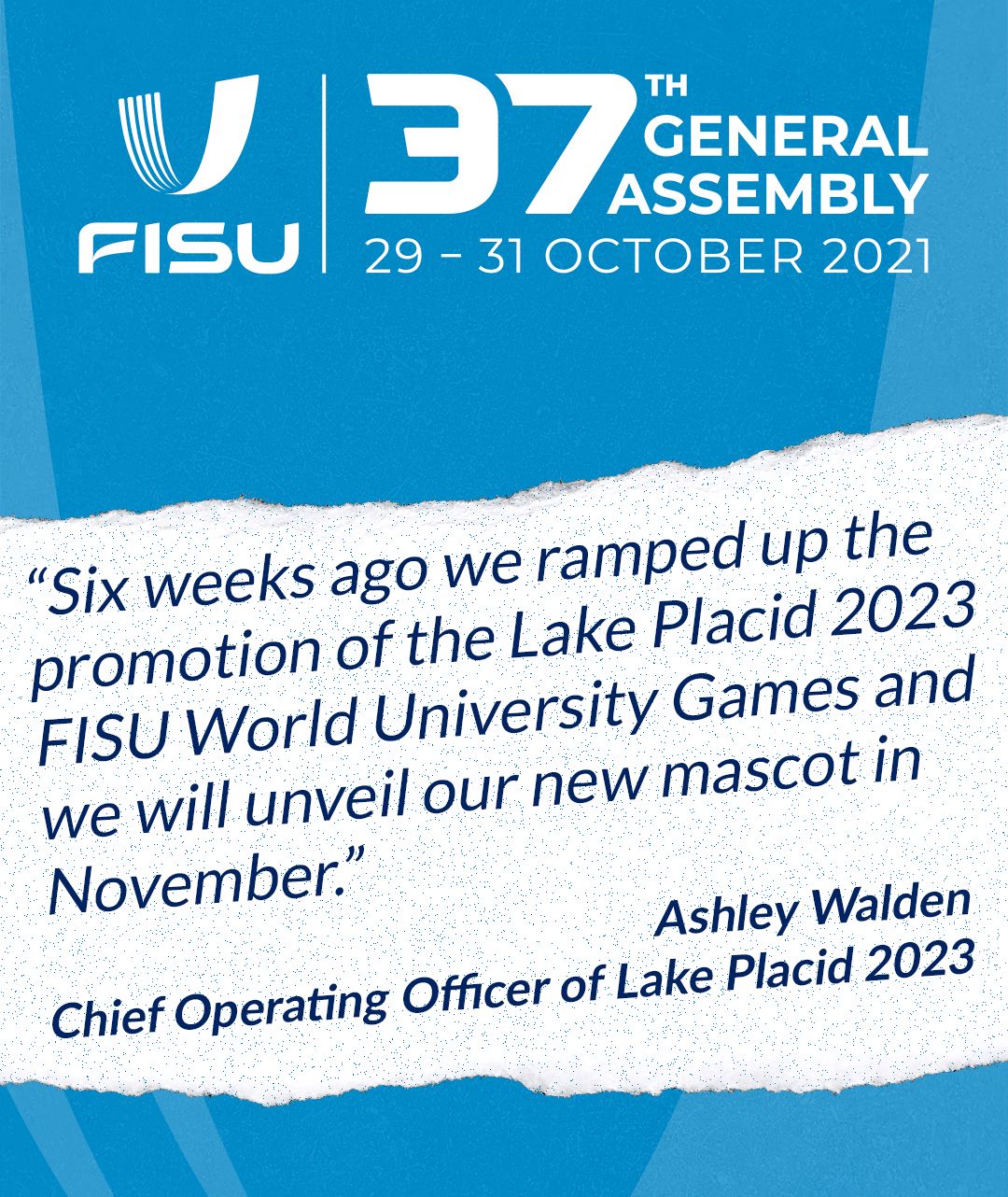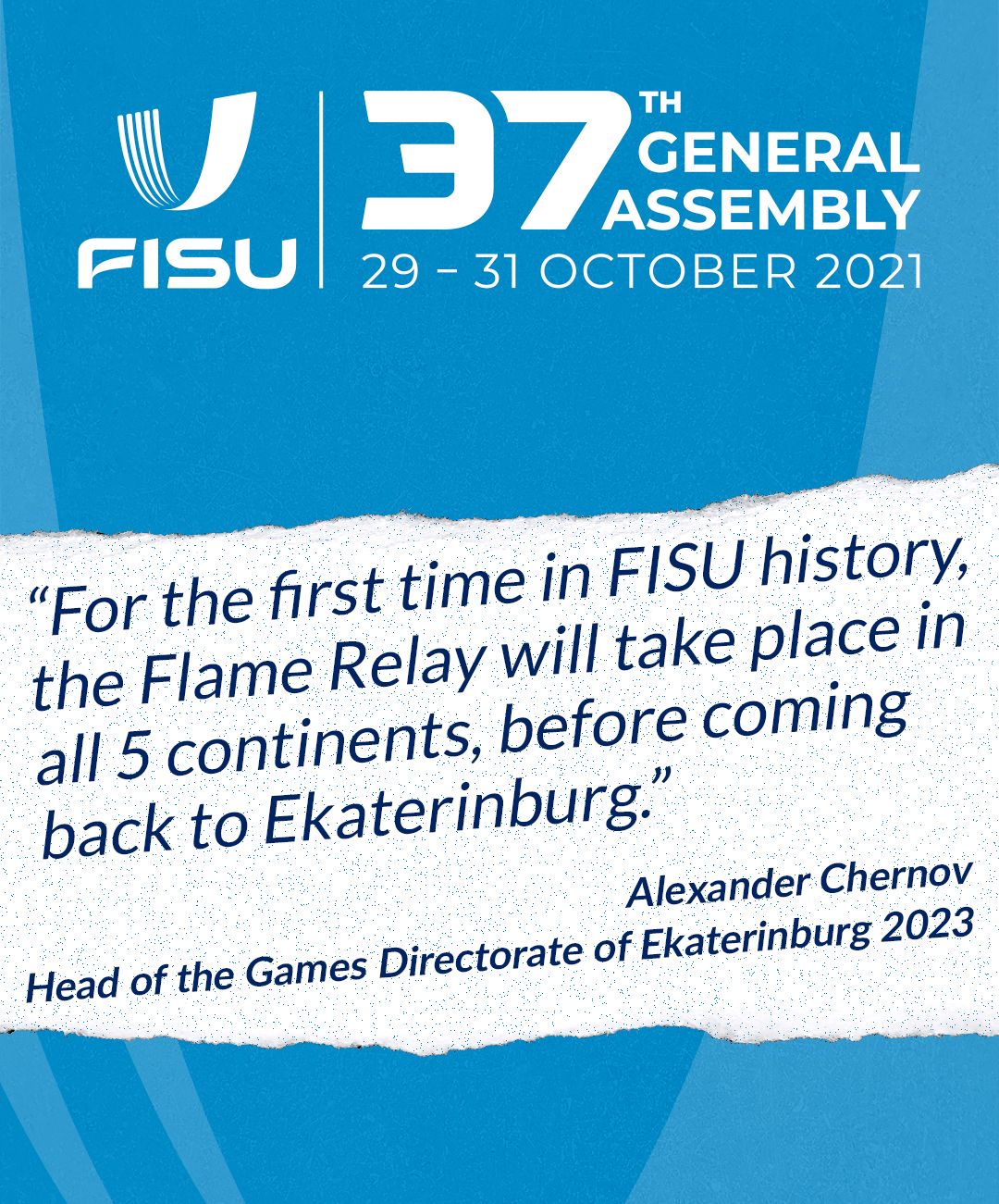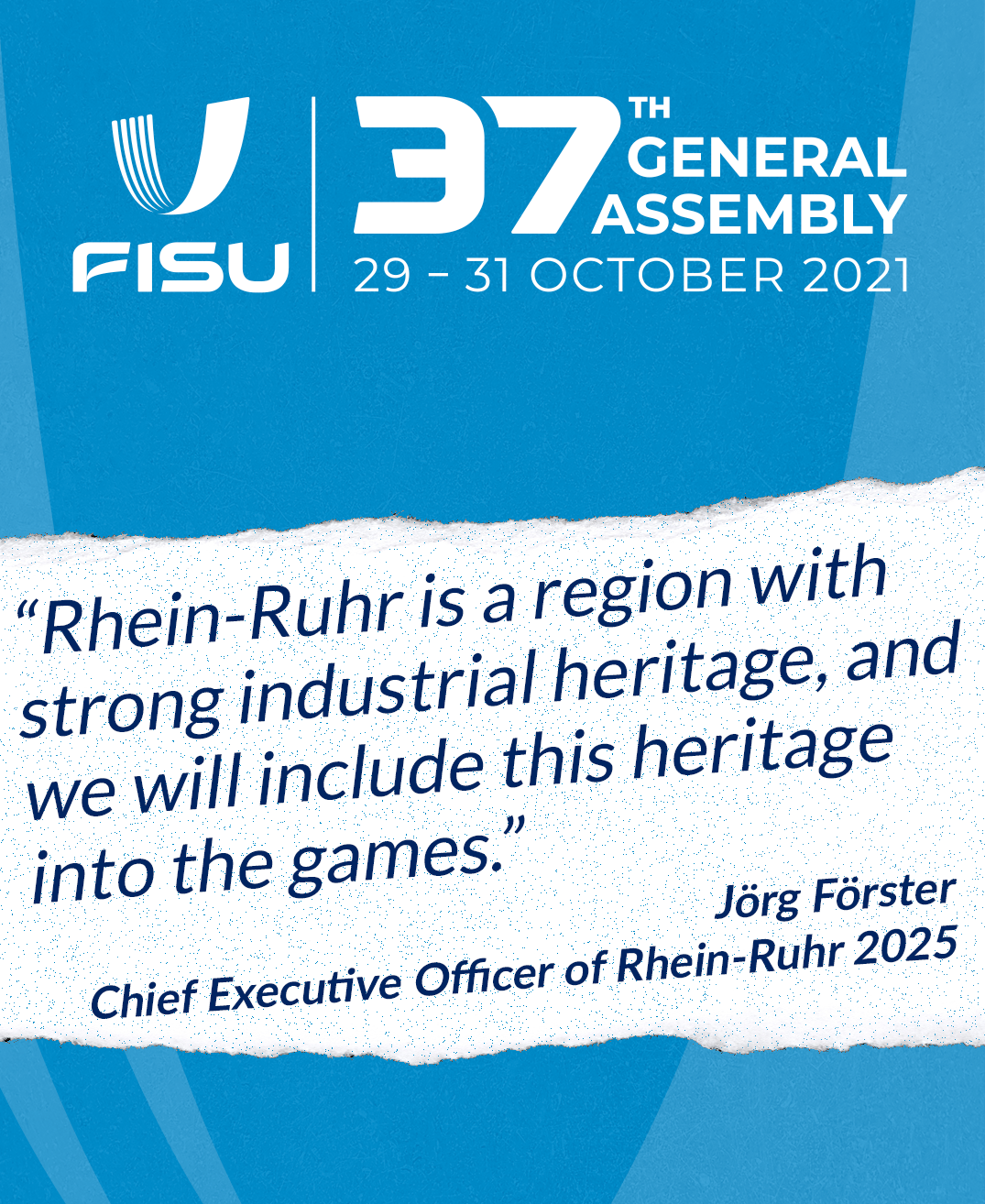 FISU Acting President Leonz Eder and FISU Secretary General-CEO Eric Saintrond
FISU Acting President Leonz Eder and FISU Secretary General-CEO Eric Saintrond
The focus of the final day of the 37th FISU General Assembly was on future events, including upcoming FISU World University Championships, FISU University World Cups, the 2022 FISU World Forum, and the four FISU World University Games that will take place in 2023 and 2025.
FISU World University Championships and FISU University World Cups
FISU Executive Committee member Marian Dymalski spoke about the cancellation of all events in 2020 due to the COVID-19 pandemic. Despite most events facing challenges, the 2020 FISU World Championship Speed Skating did manage to get all events in except for its final day, and the 2020 FISU World University Championship Mind Sport took place virtually hosted by Poland.
Moving forward, in 2022 we will have 14 FISU World University Championships, as well as the 2023 FISU World University Championship Rowing which was moved to 2023 as rowing is part of the Chengdu 2021 FISU Games. Additionally, 14 2024 FISU Championships have already been attributed. Argentina will be a first time host as the 2022 FISU Championship Modern Pentathlon will be in Buenos Aires on 21-25 September.
In addition to the planned FISU Championships next year, seven FISU University World Cups — where athletes participate by university instead of by country — are planned to be hosted in seven different countries. This includes Kosovo, that for the first time will hold a FISU event as Pristina hosts the 2022 FISU World Cup Handball on 11-17 July. Three 2022 events, football, 3×3 basketball, and rugby sevens, will have qualifying tournaments, while four events have already been attributed for 2024. Additional hosts are expected to be determined at the FISU Executive Committee meeting in December of 2022.
Costa Rica 2022 FISU World Forum
The FISU World Forum brings together students, officials and other key partners involved in the University Sport Movement with FISU Member Associations. Costa Rica will host the 2022 FISU World Forum with the central theme of university sports as a driver of sustainable development. Subtopics to be discussed by the expected 250 people onsite and 1,000 virtual attendees include good health and well-being, gender equality, quality education, and reduction of inequalities. Participants from 60 countries are expected to take part on 8-12 April 2022.
Lake Placid 2023 FISU World University Games
Lake Placid is preparing to host 12 sports, in 86 medal events, with over 50 countries expected to participate. To host the many events, organisers have expanded the hosting region beyond Lake Placid to the broader Adirondack area comprising three regions.
 The South Region will host snowboard, freeski, as well as the athlete’s village. The Central Region will welcome alpine skiing, biathlon, cross-country skiing, ski jumping, figure skating, speed skating, short track speed skating, curling, as well as ice hockey competition. The region’s Olympic Center, in Lake Placid, is famous as the location where the 1980 Winter Olympics “Miracle on Ice” took place with the USA men’s ice hockey team claiming gold. The West Region is the third area that will be used and will serve to host preliminary ice hockey games, as well as an athlete’s village specific for that sport.
The South Region will host snowboard, freeski, as well as the athlete’s village. The Central Region will welcome alpine skiing, biathlon, cross-country skiing, ski jumping, figure skating, speed skating, short track speed skating, curling, as well as ice hockey competition. The region’s Olympic Center, in Lake Placid, is famous as the location where the 1980 Winter Olympics “Miracle on Ice” took place with the USA men’s ice hockey team claiming gold. The West Region is the third area that will be used and will serve to host preliminary ice hockey games, as well as an athlete’s village specific for that sport.
Walden then spoke about the FISU World Conference that will take place January 14-16 of 2023. Its theme is “Save Winter”, about the intersection of climate change and winter sport. Areas of focus for the conference will be weather, water, energy, food, and forest.
With 40 employees currently on the project, Walden noted that planning and promotion have ramped up. Banners now dot the village of Lake Placid and with more coming to other regions, and their online presence has grown through social media and the spring 2021 launch of the website. She also mentioned next steps for the organising committee which include the mascot unveiling and test events. Three test events will help in their preparations she said – the 2022 US Olympic trials in ski jumping and nordic combined, the 2022 FISU Championship Speed Skating, and the 2022 FISU Championship Beach Volleyball.
Ekaterinburg 2023 FISU World University Games
 Following on the agenda was the presentation from Ekaterinburg 2023 FISU World University Games. First came a message from Oleg Matytsin, the Minister of Sports in Russia, who expressed excitement at welcoming the world and university sport back to Russia.
Following on the agenda was the presentation from Ekaterinburg 2023 FISU World University Games. First came a message from Oleg Matytsin, the Minister of Sports in Russia, who expressed excitement at welcoming the world and university sport back to Russia.
Matytsin was followed by the Head of the Games Directorate Alexander Chernov who emphasised that these will be zero carbon footprint games hosting over 10,000 participants from over 150 countries. The athletes will compete in 246 medal events in 15 compulsory sports, and three optional ones of boxing, sambo, and rugby sevens.
In addition to sport, Chernov spoke about the unique artistic programme which will play part of the festivities. 23 countries will compete in the public art category, while 16 each will compete in dance and music. Five countries in each art form will be expertly judged to move to the finals with one from each category chosen to participate in the closing ceremony.
The Flame Relay will also take a unique route to Ekaterinburg, Chernov explained. The distinctive five-part torch will be lit in Torino and then see each part head off to one of the five continents, so the relay will take place simultaneously across the world. The torches will visit 23 cities across the five continents before returning to visit an equal number of cities in Russia. The five parts of the torch will then be reunited in Ekaterinburg at the opening ceremony.
Torino 2025 FISU World University Games
 The home of so many historic FISU events, Torino was next up to speak of plans for the Torino 2025 FISU World University Games. The delegation was introduced by FISU Acting President Leonz Eder who asked where FISU would be without Torino, the host of the first ever Summer Universiade back in 1959 and the home of the FISU Games Flame.
The home of so many historic FISU events, Torino was next up to speak of plans for the Torino 2025 FISU World University Games. The delegation was introduced by FISU Acting President Leonz Eder who asked where FISU would be without Torino, the host of the first ever Summer Universiade back in 1959 and the home of the FISU Games Flame.
The Torino delegation for the FISU General Assembly included Centro Universitario Sportivo (CUS) Torino President Riccardo D’Elicio, Organising Committee President Alessandro Ciro Sciretti, and Director General of CUS Torino, Andrea Ippolito. They spoke of the three main elements of focus for the Torino 2025 FISU Games which are high level sport, a lasting infrastructure legacy, and a sustainable event both in environmental and economical perspectives. They feel these three elements are achievable through their strong tradition of organising events, such as the 2006 Winter Olympics, and the 2007 Winter Universiade, and the region’s four universities.
Ippolito then walked delegates through plans indicating that three regions that will play host to events, as was the case in 2007. Alpine skiing, freestyle, freeski, and snowboard will take place in Bardonecchia, Pragelato will play host to cross country skiing and biathlon, while Torino will again host figure skating, short track speed skating, ice hockey, and curling. Villages will be set up for the athletes in each region. Additionally, he noted, Torino will house the main press centre and international broadcast centre for the games, while the Pala Alpitour will again be the venue for the opening ceremonies.
Rhine-Ruhr 2025 FISU World University Games

To close out the day’s presentations, the Rhine-Ruhr 2025 FISU World University Games were introduced with FISU Executive Committee member Verena Burk bringing opening greetings. She then passed to Joerg Foerster, Chairman of the Board of adh, the German University Sports Federation.
Foerster highlighted the five cities in the host metropolitan region with its 10.5 million residents, 70 universities, over 780,000 students, and 155 research institutes that will enable a focus on sport meeting science. He went on to say that 95% of venues to be used will be existing or temporary ones, with no purpose-built venues just for the Rhine-Ruhr 2025 FISU Games.
Building on this, Foerster talked about the ability to host very compact games. This has included a targeted venue selection that focused on four components: venues that are state of the art, that have long term experience of running events, legacy usage with the ability to host future events, and a reflection of the area’s industrial heritage that will be integrated into plans.
These compact games will mean 81% of athletes will compete and train at four locations with an average travel time of 20 minutes from hotel to venue, Foerster noted. A specific athletes village will not be built, in spirit of sustainability, but instead organisers will use decentralized delegation accommodation in hotels in a maximum of three clusters. This hotel and hub model will allow participants accommodations in hotels, but all typical village services will be in the hub, such as a main dining area, lounges, and fitness and training facilities. An optimised cluster-based transportation concept will be developed to support this model.
To conclude, Foerster said that it is the hope of the organisers of the Rhine-Ruhr 2025 FISU Games to create a model that demonstrates it is possible for a broad metropolitan region to host a successful multi-sport event.
This ended a very busy but valuable and productive three days of the FISU General Assembly and delegates were thanked by FISU Acting President Eder for their time and participation. FISU Secretary General-CEO Eric Saintrond then concluded proceedings saying that 111 countries had participated in the General Assembly and that the next edition will be hosted in 2023, likely in November and at a location to be soon determined.